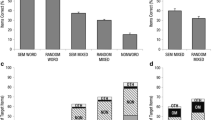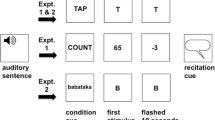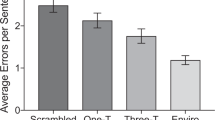Abstract
Prosodic patterns of speech appear to make a critical contribution to memory-related processing. We considered the case of a previously unexplored prosodic feature of Greek storytelling and its effect on free recall in thirty typically developing children between the ages of 10 and 12 years, using short ecologically valid auditory stimuli. The combination of a falling pitch contour and, more notably, extensive final-syllable vowel lengthening, which gives rise to the prosodic feature in question, led to statistically significantly higher performance in comparison to neutral phrase-final prosody. Number of syllables in target words did not reveal substantial difference in performance. The current study presents a previously undocumented culturally-specific prosodic pattern and its effect on short-term memory.

Similar content being viewed by others
References
Alm, C. O., & Sproat, R. (2005). Perceptions of emotions in expressive storytelling. In INTERSPEECH (pp. 533–536).
Anderson, A., Lin, C. Y., & Wang, M. (2013). Native and novel language prosodic sensitivity in english-speaking children with and without Dyslexia. Dyslexia, 19, 92–112.
Arvaniti, A. (1999). Standard modern Greek. Journal of the International Phonetic Association, 29, 167–172.
Baddeley, A. D., Thomson, N., & Buchanan, M. (1975). Word length and the structure of short-term memory. Journal of Verbal Learning and Verbal Behavior, 14, 575–589.
Baltazani, M. (2007). Prosodic rhythm and the status of vowel reduction in Greek. Selected Papers on Theoretical and Applied Linguistics, 17, 31–43.
Brierley, B., Medford, N., Shaw, P., & David, A. S. (2007). Emotional memory for words: Separating content and context. Cognition and Emotion, 21, 495–521.
Campoy, G. (2011). Retroactive interference in short-term memory and the word-length effect. Acta Psychologica, 138, 135–142.
Cowan, N., Day, L., Saults, J. S., Keller, T. A., Johnson, T., & Flores, L. (1992). The role of verbal output time in the effects of word length on immediate memory. Journal of Memory and Language, 31, 1–17.
Cutler, A., Dahan, D., & Van Donselaar, W. (1997). Prosody in the comprehension of spoken language: A literature review. Language and Speech, 40, 141–201.
Doukhan, D., Rilliard, A., Rosset, S., Adda-Decker, M., & d’Alessandro, C. (2011). Prosodic analysis of a corpus of tales. In INTERSPEECH (pp. 3129–3132).
Fairfield, B., Di Domenico, A., Serricchio, S., Borella, E., & Mammarella., N. (2016). Emotional prosody effects on verbal memory in older and younger adults. Aging, Neuropsychology, and Cognition. https://doi.org/10.1080/13825585.2016.1219690.
Fernald, A., & Mazzie, C. (1991). Prosody and focus in speech to infants and adults. Developmental Psychology, 27, 209.
Gathercole, S. E., Service, E., Hitch, G. J., Adams, A. M., & Martin, A. J. (1999). Phonological short-term memory and vocabulary development: Further evidence on the nature of the relationship. Applied Cognitive Psychology, 13, 65–77.
Gilbert, A. C., & Boucher, V. J. (2007). What do listeners attend to in hearing prosodic structures? Investigating the human speech-parser using short-term recall. In INTERSPEECH (pp. 430–433).
Goldman, S. R., Meyerson, P. M., & Cote, N. (2006). Poetry as a mnemonic prompt in children’s stories. Reading Psychology, 27, 345–376.
Grandjean, D., Bänziger, T., & Scherer, K. R. (2006). Intonation as an interface between language and affect. Progress in Brain Research, 156, 235–247.
Grassmann, S., & Tomasello, M. (2007). Two-year-olds use primary sentence accent to learn new words. Journal of Child Language, 34, 677–687.
Jalbert, A., Neath, I., & Surprenant, A. M. (2011). Does length or neighborhood size cause the word length effect? Memory & Cognition, 39, 1198–1210.
Johnstone, T., & Scherer, K. R. (1999). The effects of emotions on voice quality. In Proceedings of the XIVth international congress of phonetic sciences (pp. 2029–2032). San Francisco: University of California, Berkeley.
Katkov, M., Romani, S., & Tsodyks, M. (2014). Word length effect in free recall of randomly assembled word lists. Frontiers in Computational Neuroscience, 8, 129.
Lindfield, C. K., Wingfield, A., & Goodglass, H. (1999). The role of prosody in the mental lexicon. Brain and Language, 68, 312–317.
Männel, C., Schaadt, G., Illner, F. K., van der Meer, E., & Friederici, A. D. (2017). Phonological abilities in literacy-impaired children: Brain potentials reveal deficient phoneme discrimination, but intact prosodic processing. Developmental Cognitive Neuroscience, 23, 14–25.
Marshall, C. R., Harcourt-Brown, S., Ramus, F., & Van Der Lely, H. K. J. (2009). The link between prosody and language skills in children with specific language impairment (SLI) and/or dyslexia. International Journal of Language & Communication Disorders, 44, 466–488.
Michas, I. C., & Henry, L. A. (1994). The link between phonological memory and vocabulary acquisition. British Journal of Developmental Psychology, 12, 147–163.
Mira, W. A., & Schwanenflugel, P. J. (2013). The impact of reading expressiveness on the listening comprehension of storybooks by prekindergarten children. Language, Speech, and Hearing Services in Schools, 44, 183–194.
Montaño, R., & Alías, F. (2016). The role of prosody and voice quality in indirect storytelling speech: Annotation methodology and expressive categories. Speech Communication, 85, 8–18.
Nieuwenhuis-Mark, R. E., Schalk, K., & de Graaf, N. (2009). Free recall and learning of emotional word lists in very elderly people with and without dementia. American Journal of Alzheimer’s Disease and Other Dementias, 24, 155–162.
Reeves, C., Schmauder, R. A., & Morris, K. R. (2000). Stress grouping improves performance on an immediate serial list recall task. Journal of Experimental Psychology. Learning, Memory, and Cognition, 26, 1638–1654.
Sakkalou, E., & Gattis, M. (2012). Infants infer intentions from prosody. Cognitive Development, 27, 1–16.
Sarkar, P., Haque, A., Dutta, A. K., Reddy, G., Harikrishna, D. M., Dhara, P. et al. (2014). Designing prosody rule-set for converting neutral TTS speech to storytelling style speech for indian languages: Bengali, Hindi and Telugu. In Contemporary computing (IC3), 2014 seventh international conference (pp. 473–477).
Savino, M., Bosco, A., & Grice, M. (2013). Intonation and positional effects in spoken serial recall. Proceedings of the Annual Meeting of the Cognitive Science Society, 35, 3360–3365.
Sober, J. D., VanWormer, L. A., & Arruda, J. E. (2016). Age-related differences in recall for words using semantics and prosody. The Journal of General Psychology, 143, 67–77.
Theune, M., Meijs, K., Heylen, D., & Ordelman, R. (2006). Generating expressive speech for storytelling applications. IEEE Transactions on Audio, Speech and Language Processing, 14, 1137–1144.
Thompson, W. F., Marin, M. M., & Stewart, L. (2012). Reduced sensitivity to emotional prosody in congenital amusia rekindles the musical protolanguage hypothesis. Proceedings of the National Academy Sciences USA, 109, 19027–19032.
Verhagen, J., & Leseman, P. (2016). How do verbal short-term memory and working memory relate to the acquisition of vocabulary and grammar? A comparison between first and second language learners. Journal of Experimental Child Psychology, 141, 65–82.
Wiethoff, S., Wildgruber, D., Kreifelts, B., Becker, H., Herbert, C., Grodd, W., et al. (2008). Cerebral processing of emotional prosody—Influence of acoustic parameters and arousal. Neuroimage, 39, 885–893.
Author information
Authors and Affiliations
Corresponding author
Ethics declarations
Conflict of interest
The authors declare that they have no conflict of interest.
Rights and permissions
About this article
Cite this article
Loutrari, A., Tselekidou, F. & Proios, H. Phrase-Final Words in Greek Storytelling Speech: A Study on the Effect of a Culturally-Specific Prosodic Feature on Short-Term Memory. J Psycholinguist Res 47, 947–957 (2018). https://doi.org/10.1007/s10936-018-9570-y
Published:
Issue Date:
DOI: https://doi.org/10.1007/s10936-018-9570-y




